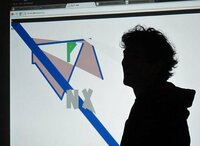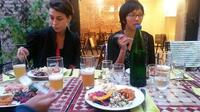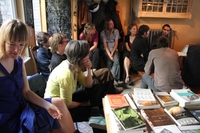COOKING=SHARING+SAVING+CARING
In februari 2019 landde ik voor een paar maanden in Constant. Ik werkte samen met Sara Manente aan haar project Wicked Technologies | Wild Fermentation. Sara gaf me een README/recept voor het kweken van kombucha en voor ik het wist was mijn eigen keuken een kinderkamer waar een hulpbehoevend wezen leefde. Met fermentatie als startpunt, begon ik verschillende acties, locaties en coderingen van ‘koken’ in de praktijk van Constant te onderzoeken. Deze inslag is een poging om een aantal van de verschillen en overlappingen tussen codering en koken, proeven en testen te indexeren. De analogieën tussen codehandleidingen en recepten lijken voor de hand te liggen: ze nodigen beiden uit tot actie en interpretatie. Deze inslag, open om te bewerken, beweegt zich gemakkelijk tussen projecten, recepten en smaak, brengt ze samen en laat ze toe om elkaar te transformeren.
(Günbike Erdemir, april 2019)
FERMENTING//EXPERIMENTING
Fermentation is maintenance, rooted in the idea of food protection. The process of growing things, and caring for them, produces a prolonged journey for you and for the food you eat. Within several traditions it developed as a collective process practiced by domestic goddesses. More recently it became an experimental interest of geek cooks/fermenters and also a new generation of home cooks are continuing the tradition as a more homey and sloppy leisure.
Fermentation is a difficult process that requires care and attention, patience and labor, maintenance and use.
A slow process but fast excess
Wild Fermentation
Installation by Sara Manente in the window of Constant:
“Queering, sampling, transferring a prototype, feeding, inoculating, oxygenating, acquiring a taste are processes involved in live cultures. Fermentation techniques challenge ideas of transformation, cannibalism, wildness, exuberance, excess, noise, opacity and death.”
(April 2019)
Splinterfields 2/4: Biochymickal Arts
“By entangling abstract scientific concepts with hands-on experiments, we aim to better grasp the basics of our tools and techniques, breathe new life into forgotten crafts, and viscerally experience the underlying interconnectedness of the arts, sciences and technologies.”
(September 2013)
This obscure side of sweetness is waiting to blossom
Pascale Barret plays and diverts tools: photo, video, 3D scanning, 3D printing, laser cutting, net performance, biochemistry (fermentation), uncreative sound and writings. For the opening of her installation “This obscure side of sweetness is waiting to blossom”, she served makgeolli, self-made fermented rice wine.
(January 2017)
TASTING//TESTING
Every single recipe is a new experiment, a journey that needs to be tested/tasted. We taste and test to sense the texture of where we are heading. Does every testing taste different?
Code Tasting
Code Tasting was a try out session of Graphical Shell, a prototype developed by Pierre Marchand in the context of the Libre Graphics Research Unit.
Open Sauces
A contribution to the FoAm Open Sauces event:
“Whatever other similarities they might be seen to share, it is the accumulation of repetition that defines the practice of cooking as much as coding. Both rely on mixing familiar gestures with yet unfamiliar ones, and through experience we learn that some forms of repetition might be less redundant than others.”
(November 2008)
http://opensauces.cc (page 62)
COOKBOOK-CODEBOOK
Books that code cooking. And some books to code are like cookbooks.
Exiled Cuisine
Ivan Monroy Lopez connected from Mexico City for a lecture/performance + dinner during an OSP public meet:
“Cookbook files are open when there’s a chance of working. The work is not technological in that nothing of this has not been done before. The literature that feeds into this has been contentionally written in the shall we say mmh street. The public space of technical forums is related in some way to network protocols. It could be good that these HTML files be exported into cookbooks. I don’t like it when these books are sold. A standard regime of the kitchen is easier for the exiled to understand.”
(January 2012)
Python for Literary Creation
A workshop with An Mertens using Phyton code for literary creation, connected the work of Oulipo to the transformative power of cooking:
“A line of code is like an action of a recipe. One prepares an ingredient, applies the action and the ingredient will be transformed. Oulipo, the Parisian collective around Raymond Queneau explored the idea of recipes or constraints for creating potential literatures since the 60s. Their work is a great inspiration for writing using code.”
(December 2017)
Puerto Cookbook
A cookbook drawn, tested and tasted with inhabitants of Puerto, OSP and Yi Liang.
(Spring 2009)
El Curanto
Alejandra Maria Perez Nunez proposed a traditional Chilean method of cooking at Verbindingen/Jonctions 10:
"El curanto is to be made together with PEOPLE and for Everyone.
- WOOD found in a dismantled house. It helps to find a ride to transport it.
- HOLE
- MUSSELS
- SPICES, rosemary and bay leaf.
- MICHAEL or some DEDICATED friend that will assist with the execution of the performance and keep the pictures afterwards for months."
(December 2007)
http://ospublish.constantvzw.org/sources/vj10/vj10-interior.pdf (page174-180)
Are You Being Served?
Replay of recipes served by Guillaume Bernier and Sunyoung during the 14th edition of Jonctions/Verbindingen, Are You Being Served?. Eight recipes were printed out and taped above eight different working posts in the kitchen of De Pianofabriek KWP. Eight people executed one task at one post, and would go onto a next one. This allowed for opening up the very intimate process of the cooks, checking the recipes and exchanging expertise.
Boektegoed Toolkit
This toolkit is freely downloadable for all children (and those who still feel like children) who want to make their own book.
(April 2009)
http://www.adashboard.org/boektegoed.pdf
KITCHEN SCENARIOS
At Constant, the kitchen often figures as the hotspot for indoor gathering, podcasting and presenting. Kitchen is a reception space where cooking and food is an actual source but also taken as a metaphor to talk about computer and coding systems. Alongside with the dynamics and rhythms of the food on table; manuals, reports, recipes, notes are shared, prepared, distributed. Some examples:
Daniel Miracle kitchentable presentation
(December 2012)
Algolit: kitchen table presentation
(July 2013)
Active Archives Kitchen Table Workshops
“How can writing, reading and listening act as parallel but interacting tracks? How to provide forms of access that can go beyond findability and searchability?” Workshop with Sarma and the Active Archives Video Wiki.
(July 2010)
VJ11.4 Semiotics of the kitchen radio
“With amongst others: an interview with artist Kate Rich about cooking and trade, a conversation with Nicolas Malevé about Cake PHP frameworks and other recipes, a reportage on Colruyt computersystems, The Swedish Cook, a text-to-speech cookbook, instructions for producing a manual, a foley artist, a ‘Comédie de moeurs’ and of course a mouthwatering playlist.”



